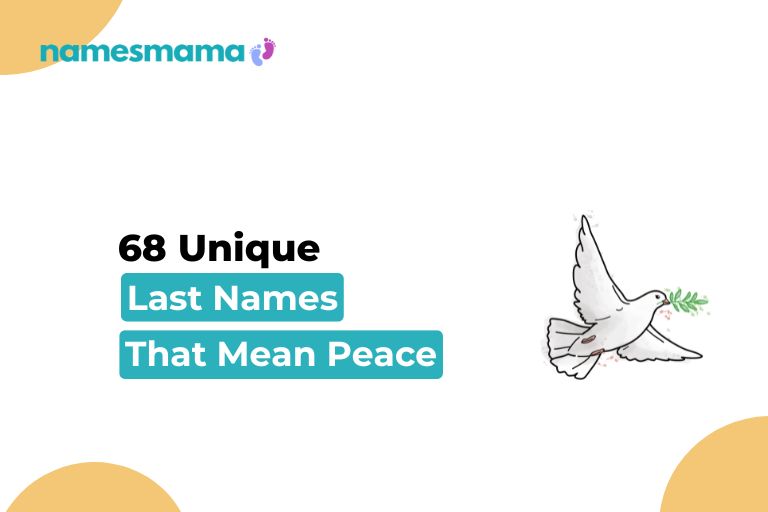75 Cool Last Names That Mean Nature
The natural world has always been a source of inspiration for names representing power, loveliness, and a connection to the earth.
Many surnames have their origins in nature, taking cues from trees, rivers, wildlife, and scenery.
If you’re digging into your family history or searching for a meaningful last name, these nature-based surnames show a strong link to the environment.
From last names that mean woodland to those that draw inspiration from the heavens, here’s a list of 75 surnames that pay tribute to the splendor of the natural world!
Last Names That Mean Nature
Greenwood (English) – Refers to a lush, green forest or wooded area.
Rivers (English) – Derived from the word “river,” symbolizing flowing water and nature.
Forrest (Scottish/English) – Means “forest,” representing trees, greenery, and the wilderness.
Hill (English) – Refers to a raised area of land, symbolizing elevation and stability.
Lake (English) – Inspired by lakes, symbolizing tranquility and the power of water.
Flint (English) – Named after the hard rock, often linked to resilience and strength.
Stone (English) – Represents rocks, symbolizing endurance and a connection to the earth.
Oakley (English) – Means “oak clearing,” representing oak trees and strong forests.
Ashford (English) – Means “ford near the ash trees,” linking to woodlands and rivers.
Feldman (German) – Means “man of the field,” symbolizing open lands and agriculture.
Baumann (German) – Means “tree man” or “builder,” connecting to forestry and nature.
Berg (German/Scandinavian) – Means “mountain” in German, representing high landscapes.
Lindberg (Swedish) – Means “linden tree mountain,” combining trees and landscape features.
Hollis (English) – Means “dweller near holly trees,” a surname inspired by plants.
Sylvester (Latin/French) – From silva, meaning “forest” or “wooded land.”
Yamamoto (Japanese) – Means “base of the mountain,” a name linked to landscapes.
Hayashi (Japanese) – Means “forest,” representing a deep connection to wooded nature.
Ishikawa (Japanese) – Means “stone river,” symbolizing water and rocky landscapes.
Kawasaki (Japanese) – Means “river cape,” a surname linked to bodies of water.
Zhou (Chinese) – Means “boat” or “island,” symbolizing water and travel.
Nasrin (Persian) – Means “wild rose,” inspired by flowers and plant life.
Barzani (Kurdish) – Derived from a mountainous region, symbolizing the natural landscape.
Arslan (Turkish) – Means “lion,” an animal-inspired surname representing strength and nature.
Gökçe (Turkish) – Means “sky-colored” or “blue,” symbolizing the open sky and air.
Shimizu (Japanese) – Means “pure water,” connecting to natural springs and clarity.
Okonkwo (Igbo, Nigeria) – Means “born on Nkwo market day,” often linked to nature’s cycles.
Zuberi (Swahili) – Means “strong,” often associated with the power of natural forces.
Tembo (Swahili) – Means “elephant,” symbolizing wisdom and the animal kingdom.
Maziwa (Swahili) – Means “milk” but is often used to reference rivers or water sources.
Nyoka (Zulu) – Means “snake,” representing transformation and nature’s wildlife.
Leskov (Russian) – Means “forest” or “woods,” symbolizing lush greenery.
Volkov (Russian) – Means “wolf,” representing animals and their role in nature.
Dubrovsky (Russian) – Means “oak forest,” a surname linked to mighty trees.
Järvinen (Finnish) – Means “lake” or “small body of water,” connecting to nature.
Zelenka (Czech) – Means “green” or “lush vegetation,” symbolizing thriving nature.
Underwood (English) – Means “below the forest,” referring to someone living near woods.
Meadows (English) – Refers to open grasslands or lush, natural fields.
Brook (English) – Derived from small streams, symbolizing flowing water and purity.
Wells (English) – Comes from natural water springs, representing life and renewal.
Hawthorne (English) – Named after the hawthorn tree, known for its protective thorns.
Thorne (English) – Related to thorny plants, symbolizing strength and resilience.
Rowan (Scottish/Irish) – Named after the rowan tree, associated with protection and magic.
Heath (English) – Refers to an open, uncultivated land filled with wild plants.
Blomqvist (Swedish) – Means “flower branch,” symbolizing blooming nature and beauty.
Rosenberg (German) – Means “rose mountain,” combining floral and landscape elements.
Seifert (German) – Derived from Sief, meaning “river” or “lake settlement.”
Schneider (German) – Though meaning “tailor,” it’s also associated with “scythe,” used in farming.
Montague (French) – Means “pointed mountain,” representing landscapes and high terrains.
Marlowe (English) – Derived from “driftwood,” representing nature’s cycle of decay and renewal.
Delmar (Spanish) – Means “of the sea,” directly referencing the ocean.
Vega (Spanish) – Means “meadow” or “fertile plain,” symbolizing agriculture and nature’s bounty.
Bosque (Spanish) – Means “forest” or “woodlands,” representing a connection to trees.
Fuentes (Spanish) – Means “fountains” or “springs,” referring to natural water sources.
Sierra (Spanish) – Means “mountain range,” representing rugged landscapes and high peaks.
Takagi (Japanese) – Means “tall tree,” symbolizing growth and deep roots in nature.
Fujimoto (Japanese) – Means “origin of the wisteria,” referring to the beautiful wisteria plant.
Matsuoka (Japanese) – Means “pine tree hill,” blending tree and landscape symbolism.
Aoyama (Japanese) – Means “blue mountain,” symbolizing peace and serenity.
Sakurai (Japanese) – Means “cherry blossom well,” referencing Japan’s famous cherry trees.
Rahman (Arabic) – Means “merciful” but often associated with abundant natural blessings.
Shahbaz (Persian) – Means “royal falcon,” linking to majestic birds of prey.
Jafari (Persian) – Comes from Jafar, meaning “small stream” or “rivulet.”
Alem (Turkish) – Means “world” or “universe,” symbolizing the vastness of nature.
Samandar (Urdu/Persian) – Means “ocean,” representing the power and vastness of the sea.
Makena (Kikuyu, Kenya) – Means “one who brings happiness,” often linked to nature’s beauty.
Kiboko (Swahili) – Means “hippopotamus,” an animal deeply tied to African rivers.
Bahati (Swahili) – Means “luck” or “fortune,” often associated with nature’s generosity.
Tendai (Shona, Zimbabwe) – Means “thankful,” often linked to gratitude for nature.
Banda (Chewa, Malawi) – Means “mountain” or “rock,” representing strength in nature.
Nyirenda (Chewa, Malawi) – Means “hunter” or “one who tracks in nature.”
Dube (Zulu, South Africa) – Means “zebra,” symbolizing the wild beauty of African savannas.
Ezeagu (Igbo, Nigeria) – Means “king of the forest,” showing dominance over the wild.
Onyema (Igbo, Nigeria) – Means “who knows tomorrow,” often tied to nature’s unpredictability.
Mamba (Zulu) – Means “snake,” inspired by the black mamba, one of Africa’s most iconic reptiles.
Gorski (Polish) – Means “mountain dweller,” referencing highlands and peaks.
Lipinski (Polish) – Means “linden tree,” a name inspired by strong, ancient trees.
Kowalski (Polish) – While meaning “blacksmith,” it’s also linked to “fields and meadows.”
Veselov (Russian) – Means “happy” but often associated with spring and nature’s renewal.
Dubov (Russian) – Means “oak tree,” representing strength and endurance.
Balodis (Latvian) – Means “pigeon,” representing peace and the animal kingdom.
Eglitis (Latvian) – Means “little fir tree,” symbolizing evergreen forests.
Kalnins (Latvian) – Means “small hill,” referring to natural landscapes.
Zaleski (Polish) – Means “of the woods,” a surname rooted in forests.
Orlov (Russian) – Means “eagle,” symbolizing power, vision, and nature’s majesty.
Closing Remarks
Nature is something we can’t ignore as we live with it, and is something everyone wants to spend with. I hope you loved this article on last names that mean nature, and thanks for being here.



